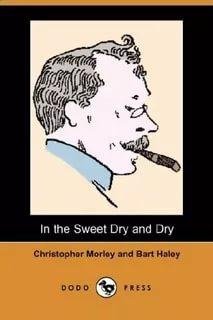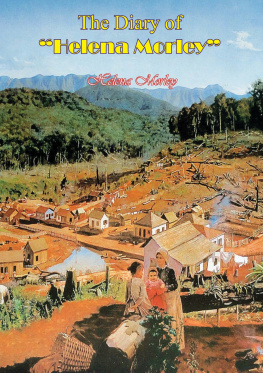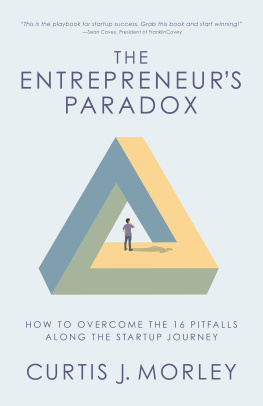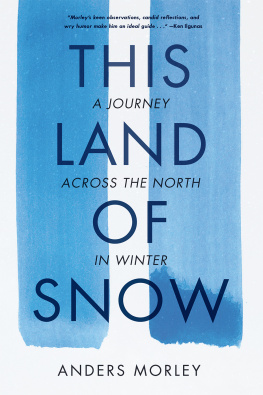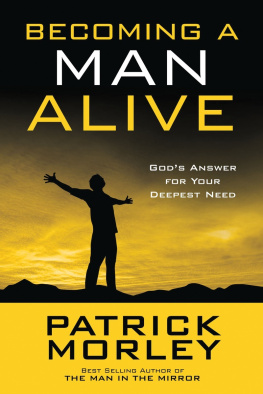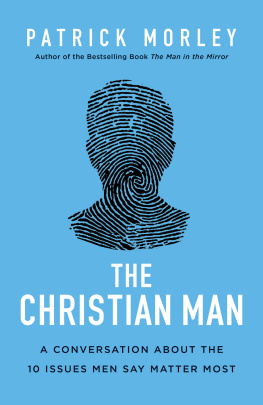Christopher Morley - In The Sweet Dry And Dry
Here you can read online Christopher Morley - In The Sweet Dry And Dry full text of the book (entire story) in english for free. Download pdf and epub, get meaning, cover and reviews about this ebook. genre: Prose. Description of the work, (preface) as well as reviews are available. Best literature library LitArk.com created for fans of good reading and offers a wide selection of genres:
Romance novel
Science fiction
Adventure
Detective
Science
History
Home and family
Prose
Art
Politics
Computer
Non-fiction
Religion
Business
Children
Humor
Choose a favorite category and find really read worthwhile books. Enjoy immersion in the world of imagination, feel the emotions of the characters or learn something new for yourself, make an fascinating discovery.
- Book:In The Sweet Dry And Dry
- Author:
- Genre:
- Rating:3 / 5
- Favourites:Add to favourites
- Your mark:
- 60
- 1
- 2
- 3
- 4
- 5
In The Sweet Dry And Dry: summary, description and annotation
We offer to read an annotation, description, summary or preface (depends on what the author of the book "In The Sweet Dry And Dry" wrote himself). If you haven't found the necessary information about the book — write in the comments, we will try to find it.
In The Sweet Dry And Dry — read online for free the complete book (whole text) full work
Below is the text of the book, divided by pages. System saving the place of the last page read, allows you to conveniently read the book "In The Sweet Dry And Dry" online for free, without having to search again every time where you left off. Put a bookmark, and you can go to the page where you finished reading at any time.
Font size:
Interval:
Bookmark:
Christopher Morley and Bart Haley
In The Sweet Dry And Dry
ILLUSTRATED BY GLUYAS WILLIAMS
DEDICATED TO G. K. CHESTERTON
MOST DELIGHTFUL OF MODERN DECANTERBURY PILGRIMS
FOREWORD
As far as this book is concerned, the public may Take It, or the public may Let It Alone. But the authors feel it their duty to say that no deductions as to their own private habits are to be made from the story here offered. With its composition they have beguiled the moments of the valley of the shadow.
Acknowledgement should be made to the Evening Public Ledger of Philadelphia for permission to reprint the ditty included in Chapter VI.
The public will forgive this being only a brief preface, for at the moment of writing the time is short. Wishing you a Merry Abstinence, and looking forward to meeting you some day in Europe, CHRISTOPHER MORLEY, BART HALEY.
Philadelphia, Ten minutes before Midnight, June 30, 1919.
CHAPTER I
MYSTERY OF THE UNEXPECTED JULEP
Dunraven Bleak, the managing editor of The Evening Balloon, sat at his desk in the center of the local-room, under a furious cone of electric light. It was six o'clock of a warm summer afternoon:
he was filling his pipe and turning over the pages of the Final edition of the paper, which had just come up from the press-room.
After the turmoil of the day the room had quieted, most of the reporters had left, and the shaded lamps shone upon empty tables and a floor strewn ankle-deep with papers. Nearby sat the city editor, checking over the list of assignments for the next morning. From an adjoining kennel issued occasional deep groans and a strong whiff of savage shag tobacco, blown outward by the droning gust of an electric fan. These proved that the cartoonist (a man whose sprightly drawings were born to an obbligato of vehement blasphemy) was at work within.
Mr. Bleak was just beginning to recuperate from the incessant vigilance of the day's work. There was an unconscious pathos in his lean, desiccated figure as he rose and crossed the room to the green glass drinking-fountain. After the custom of experienced newspapermen, he rapidly twirled a makeshift cup out of a sheet of copy paper. He poured himself a draught of clear but rather tepid water, and drank it without noticeable relish. His lifted head betrayed only the automatic thankfulness of the domestic fowl.
There had been a time when six o'clock meant something better than a paper goblet of lukewarm filtration.
He sat down at his desk again. He had loaded his pipe sedulously with an extra fine blend which he kept in his desk drawer for smoking during rare moments of relaxation when he had leisure to savor it. As he reached for a match he was meditating a genial remark to the city editor, when he discovered that there was only one tandsticker in the box. He struck it, and the blazing head flew off upon the cream-colored thigh of his Palm Beach suit. His naturally placid temper, undermined by thirty years of newspaper work and two years of prohibition, flamed up also. With a loud scream of rage and a curse against Sweden, he leaped to his feet and shook the glowing cinder from his person. Facing him he found a stranger who had entered the room quietly and unobserved.
This was a huge man, clad in a sober uniform of gray cloth, with silver buttons and silver braid. A Sam Browne belt of wide blue leather marched across his extensive diagonal in a gentle curve.
The band of his vizored military cap showed the initials C.P.H. in silver embroidery. His face, broad and clean-shaven, shone with a lustre which was partly warmth and partly simple friendliness.
Save for a certain humility of bearing, he might have been taken for the liveried door-man of a moving-picture theater or exclusive millinery shop.
In one hand he carried a very large black leather suit-case.
"Is this Mr. Bleak?" he asked politely.
"Yes," said the editor, in surprise. His secret surmise was that some one had died and left him a legacy which would enable him to retire from newspaper work. (This is the unacknowledged dream that haunts many journalists.) Mr. Bleak was wondering whether this was the way in which legacies were announced.
The man in the gray uniform set the bag down with great care on the large flat desk. He drew out a key and unlocked it. Before opening it he looked round the room. The city editor and three reporters were watching curiously. A shy gayety twinkled in his clear blue eyes.
"Mr. Bleak," he said, "you and these other gentlemen present are men of discretion-?"
Bleak made a gesture of reassurance.
The other leaned over the suit-case and lifted the lid.
The bag was divided into several compartments. In one, the startled editor beheld a nest of tall glasses; in another, a number of interesting flasks lying in a porcelain container among chipped ice. In the lid was an array of straws, napkins, a flat tray labeled CLOVES, and a bunch of what looked uncommonly like mint leaves. Mr. Bleak did not speak, but his pulse was disorderly.
The man in gray drew out five tumblers and placed them on the desk. Rapidly several bottles caught the light: there was a gesture of pouring, a clink of ice, and beneath the spellbound gaze of the watchers the glasses fumed and bubbled with a volatile potion. A glass mixing rod tinkled in the thin crystal shells, and the man of mystery deftly thrust a clump of foliage into each. A
well known fragrance exhaled upon the tobacco-thickened air.
"Shades of the Grail!" cried Bleak. "Mint julep!"
The visitor bowed and pushed the glasses forward. "With the compliments of the Corporation," he said.
The city editor sprang to his feet. Sagely cynical, he suspected a ruse.
"It's a plant!" he exclaimed. "Don't touch it! It's a trick on the part of the Department of Justice, trying to get us into trouble."
Bleak gazed angrily at the stranger. If this was indeed a federal stratagem, what an intolerably cruel one! In front of him the glasses sparkled alluringly: a delicate mist gathered on their ice-chilled curves: a pungent sweetness wavered in his nostrils.
"See here!" he blurted with shrill excitement. "Are you a damned government agent? If so, take your poison and get out."
The tall stranger in his impressive uniform stood erect and unabashed. With affectionate care he gave the tumblers a final musical stir.
"O ye of little faith!" he said calmly. The sadness of the misunderstood idealist grieved his features. "Have you forgotten the miracle of Cana?" From his pocket he took a card and laid it on the desk.
Bleak seized it. It said:
THE CORPORATION FOR THE PERPETUATION OF HAPPINESS
1316 Caraway Street
Virgil Quimbleton, Associate Director
He stared at the pasteboard, stupefied, and handed it to the city editor.
Meanwhile the three reporters had drawn near. Light-hearted and irresponsible souls, unoppressed by the embittered suspicion of their superiors, they nosed the floating aroma with candid hilarity.
"The breath of Eden!" said one.
"It's a warm evening," remarked another, with seeming irrelevance.
The face of Virgil Quimbleton, the man in gray, relaxed again at these marks of honest appreciation. He waved an encouraging arm over the crystals. "With the compliments of the Corporation," he repeated.
Bleak and the city editor looked again at the card, and at each other. They scanned the face of their mysterious benefactor.
Bleak's hand went out to the nearest glass. He raised it to his lips. An almost-forgotten formula recurred to him. "Down the rathole!" he cried, and tilted his arm. The others followed suit, and the associate director watched them with a glow of perfect altruism.
The glasses were still in air when the cartoonist emerged from his room. "Holy cat!" he cried in amazement. "What's going on?" He seized one of the empty vessels and sniffed it.
Font size:
Interval:
Bookmark:
Similar books «In The Sweet Dry And Dry»
Look at similar books to In The Sweet Dry And Dry. We have selected literature similar in name and meaning in the hope of providing readers with more options to find new, interesting, not yet read works.
Discussion, reviews of the book In The Sweet Dry And Dry and just readers' own opinions. Leave your comments, write what you think about the work, its meaning or the main characters. Specify what exactly you liked and what you didn't like, and why you think so.

